The Maldives is a tourist magnet with its 1,000+ coral islands, the world’s first underwater restaurant, and dreamy beaches you find only on postcards. In 2023, this Indian Ocean gem set a tourism record, rolling out the welcome mat for 1.87 million visitors—that’s 12% more than in 2022.
The Maldives is placed in the second safety category by major travel advisories, which means that it’s safe but you should exercise increased caution. Malé, the capital, is where most of the criminal activity goes down, but you won’t be hanging around there much anyway.
As a tourist, you’ll likely be soaking up the sun in a resort, kept safe by security and surrounded by other vacationers. Still, even in those remote resorts, a few safety precautions won’t hurt, so let’s dive in and get you ready for paradise!
Are you planning a last minute trip to Maldives? We’ve put together all the resources you’ll need for a fun & safe travel:
🛌 Best & Safest Places to Stay in Maldives:
👉 SO/ Maldives – Outdoor swimming pool, Garden, Beachfront
👉 Rasdu View Inn – Private beach area, Family rooms, Restaurant
👉 Ifuru Island Resort Maldives – Airport shuttle, Restaurant, Private beach area
👉 Splendour Grand – Private beach area, Restaurant, Breakfast
⛱️ Fun Activities & Tours in Maldives:
👉 4 Hour Highlights of Malé Walking Tour
👉 Sandbank Snorkeling and Sunset Cruise
👉 Honeymoon on Maldives
🚗 Best & Safest Maldives Transportation Services:
👉 Airport Pickup Service – Welcome Pickups
👉 Rent a Car – DiscoverCars
🙏 Stay Safe While Travelling:
👉 Safetywing (for medical insurance)
👉 VisitorsCoverage (for trip insurance)
Is the Maldives Safe?
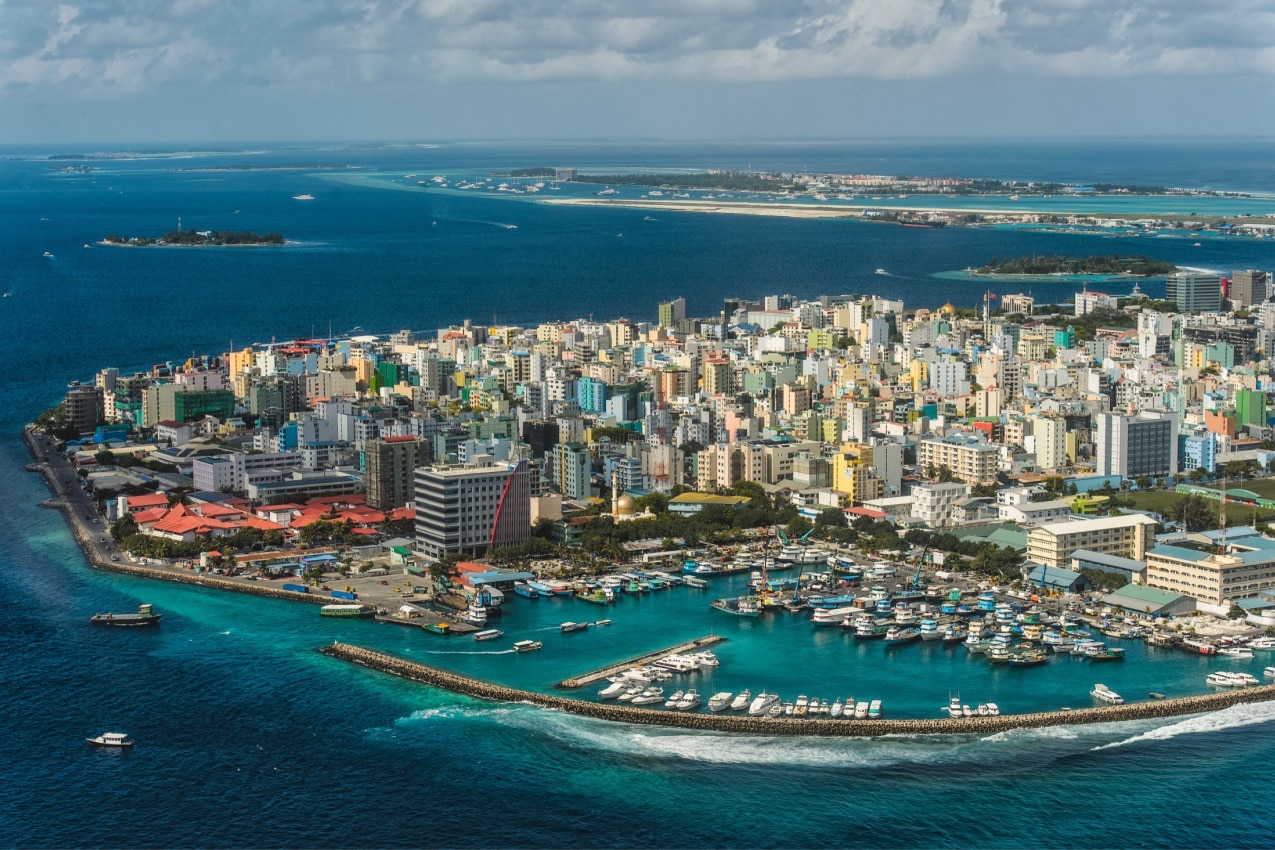
The Maldives is generally safe. Security teams keep a close watch on who comes and goes in those dreamy resorts, so you’re in good hands.
The worst-case scenario that could occur in these resorts is petty theft from hotel rooms or the beach—but that’s the kind of thing that may happen anywhere you go.
In the past, there were some protests, threats of terrorist attacks, and gang activity, but that’s mainly around Malé—it doesn’t spill over into the resort paradise. Remember, the resorts are on their own islands, and the airport has a whole island to itself—so you’d be completely isolated from the high-crime areas.
What you should keep in mind is that as it’s a Muslim country, the Maldives has its own set of rules and customs. Bikinis might be a no-go on some beaches, and certain islands may not allow pork and alcohol consumption. Respect the local culture, and you’ll have a smooth and enjoyable stay.
- International travel advisories: Level two, practice increased caution
- Crime rating: 55.02, moderate
- Most common crimes: Theft, traffic incidents, and drug-related crimes
- High-crime areas: Malé (especiallyMaafannu, Henveyru, Galolgu, and Mahchangolhi) and Hulhumalé
- Public transportation safety: Boats and seaplanes are safe and up to safety standards, but buses are only limited to certain routes
- Safety walking alone during the day: Moderate
- Safety walking alone during the night: Low
- Beach safety: The majority of beaches are safe; there are lifeguards present and safety flags set in place that inform you about the swimming conditions
- Common natural disasters: Tropical cyclones, floods, earthquakes, and tsunamis
- Carbon monoxide: You may suffer carbon monoxide poisoning if the gas leaks from a faulty appliance in your hotel room (carbon monoxide detector is advised) or from faulty scuba diving equipment
- Police presence: The police force is mainly found in the urbanized islands where crime is more active, whereas, on the resort islands, their presence is less visible; all resorts have security guards instead
- Medical care quality: Patients should receive good quality care, however, the hospitals are limited, and some may not accept travel insurance for medical coverage
Travel Advisory for the Maldives
The travel advisories of the United States, United Kingdom, Canada, New Zealand, and Australia give the Maldives a level-two travel advisory, meaning you should exercise a higher degree of caution.
The authorities warn about upcoming elections in the capital Malé in 2024. The concern is because past political protests sometimes got heated, with clashes between police, military, and protestors. So, the word from the advisories is to steer clear of demonstrations and big gatherings, because things can go south real quick.
Advisories also mention a couple of terrorist incidents from the past, like an explosive device going off in Central Malé in 2021. There have been no recent terrorist incidents, but authorities are urging tourists to remain vigilant in public places.
Now, in urban spots like Malé and Hulhumalé, you might run into some gang-related problems. But in resorts and hotel rooms, thankfully, the only crime you may fall victim to is petty theft.
The monsoon season from mid-May to November may also pose a safety concern — bringing strong winds, rough seas, and heavy rain. Tsunamis may also occur, and the currents around the Maldives can get wild— they’ve led to some drowning incidents in the past. Be careful, because there might not be safety details at some of the beaches.
A Comprehensive Look at the Maldives Crime Rates
The Maldives has a moderate crime rating of 55.02.
In the first quarter of 2023, the Maldives police force recorded a total of 2,847 crimes. The majority were theft (976 cases), traffic accidents (393 cases), and activities involving illegal substances (359 cases).
Malé is where most of the criminal activity went down (1,779 cases). Hulhumalé had 611 cases, Hulhule 41, and Villigili 56—not many compared to the capital.
Now, since most tourists head straight to their resorts, they rarely find themselves in areas where all the crime is happening.
| Safety Concerns | Crime Rate | Status |
| Overall Crime Level | 58.14 | Moderate |
| Increase in Crime (Past 3 Years) | 61.60 | High |
| Home Break-Ins and Thefts | 55.18 | Moderate |
| Mugging and Robbery | 54.71 | Moderate |
| Car Theft | 36.82 | Low |
| Theft from Vehicles | 45.28 | Moderate |
| Personal Attacks | 50.97 | Moderate |
| Verbal Insults | 53.79 | Moderate |
| Racial, Ethnic, Gender, or Religious-Based Attacks | 36 | Low |
| Drug Use and Dealing | 73.99 | High |
| Property Crimes (Vandalism and Theft) | 61.71 | High |
| Violent Crimes (Assault and Armed Robbery) | 54.33 | Moderate |
| Corruption and Bribery | 74 | High |
| Safety Walking Alone in Daylight | 58.68 | Moderate |
| Safety Walking Alone at Nighttime | 38.83 | Low |
Source: Numbeo, 2024 data based on 107 contributors.
Police Presence in the Maldives
The Maldives Police Force is your go-to protection in this tropical paradise. While Dhivehi is the local language, most Maldivian cops speak English pretty well, so you won’t have trouble getting your point across.
You might notice more police in busier spots like Malé and Hulhumalé where there’s more criminal activity. However, you can often find policemen ensuring order and safety in resort islands. If not, the security personnel are there to keep things in check.
Given that the Maldives is an Islamic nation, it’s crucial to respect local customs and laws to avoid any legal issues. Here are some key points:
- Avoid using or carrying illegal substances
- Importing alcohol isn’t allowed
- Consuming alcohol is only allowed on specific resort islands
- Wearing a bikini isn’t allowed everywhere, so search for signposts/boards that indicate where swimwear is permitted on beaches
- Do not bring pornography or pork products into the country
- Dress and behave conservatively in non-resort areas
If approached by the police, be polite and keep your identification documents handy. With a respectful approach and a commitment to following the law, your experience in the Maldives is sure to be positive.
Public Transportation Safety in the Maldives
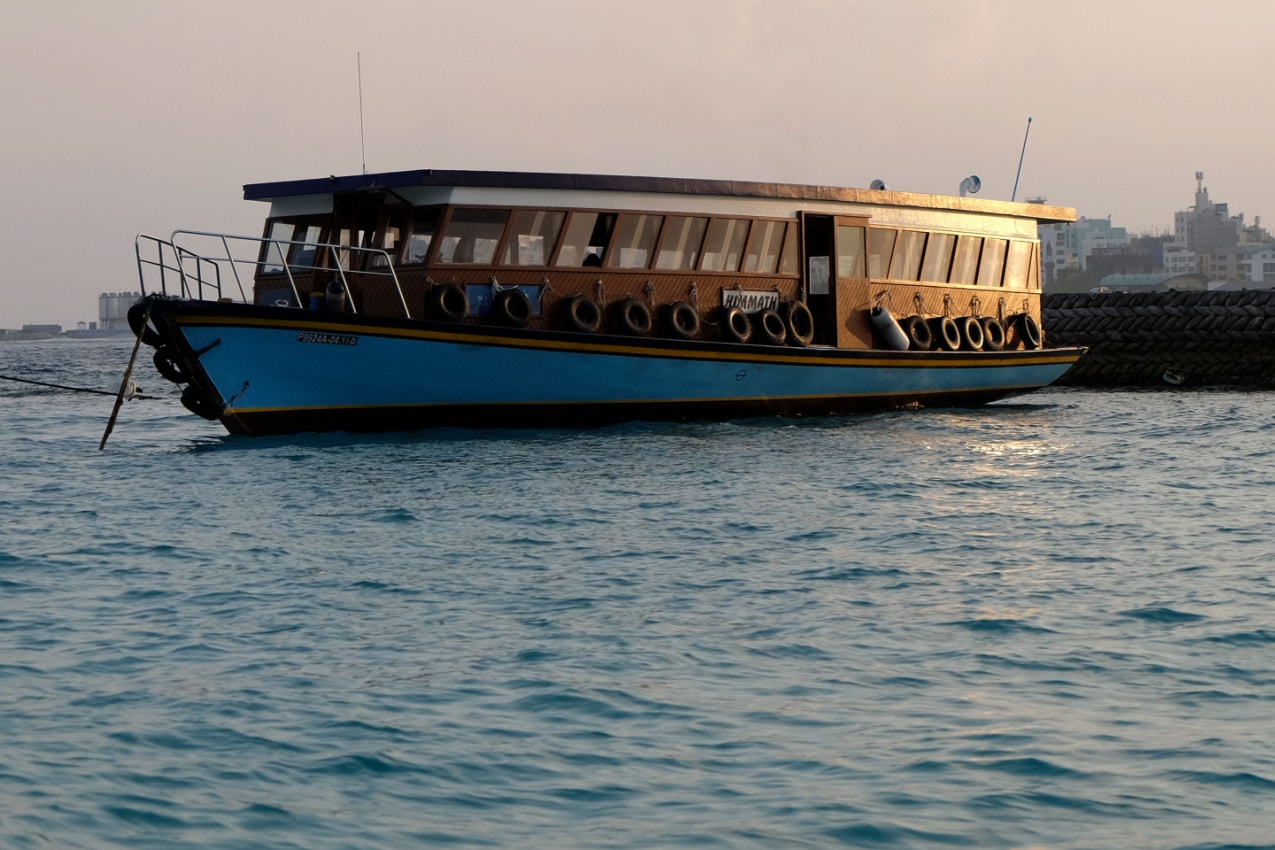
Truth be told, you won’t need transport unless you’re island-hopping by boat or seaplane—which is a safe and enjoyable experience.
The captains and crews are trained professionals and will make sure you know the ropes when it comes to safety. So, pay attention when the staff explains the rules and safety precautions. If you feel uneasy at any point, give the captain a heads-up pronto, so they have enough time to take the necessary actions.
Now, if you find yourself in the busier islands like Malé and Hulhumalé, you’ve got options like buses and taxis. Bus services are safe, but their routes are limited to certain areas. The frequency of their routes is every half an hour, but it may take longer if there’s traffic involved.
Taxis are a more convenient option. They’re safer, especially after dark, and give you the freedom to choose your drop-off spot. You can ask the resort staff to get you a taxi or, there are services like Dialacab, Loyal Taxi, or New Taxi that you can call. Also, since the islands are fairly small, many people share taxis here, so don’t be surprised if a cab already carrying passengers stops for you.
Medical Care Quality in the Maldives
Most resort islands have access to doctors or their own medical facilities; the fully equipped hospitals are primarily located in Malé and Hulhumalé.
Here are some notable hospitals in the Maldives that you may consider:
- Indira Gandhi Memorial Hospital (IGMH)
- Tree Top Hospital
- ADK Hospital
- Ungoofaaru Regional Hospital
- Maldives National Defense Force (MNDF) Hospital
- Hulhumale’ Hospital
- Kulhudhuffushi Regional Hospital
- Gan Regional Hospital
- Dr.Abdul Samad Memorial Hospital
These hospitals generally provide good quality care for minor illnesses and injuries. However, in the case of severe medical conditions, patients may need to be evacuated to hospitals overseas, typically in India or Sri Lanka, where more advanced medical care is available.
Receiving medical care abroad goes hand in hand with picking the right travel insurance that will cover your medical expenses while there. Otherwise, you’ll have to cover much higher medical bills than you would if you’re insured.
Some reputable options include VisitorsCoverage, Insured Nomads, and SafetyWing. Before finalizing your insurance, ensure that the hospitals you may potentially need are supported by the insurance plans. For instance, ADK Hospital accepts some insurance plans, but Indira Gandhi Memorial Hospital has a more complex policy. Planning ahead with the right insurance can make a significant difference in unforeseen circumstances.
Is It Safe to Travel Solo in the Maldives?
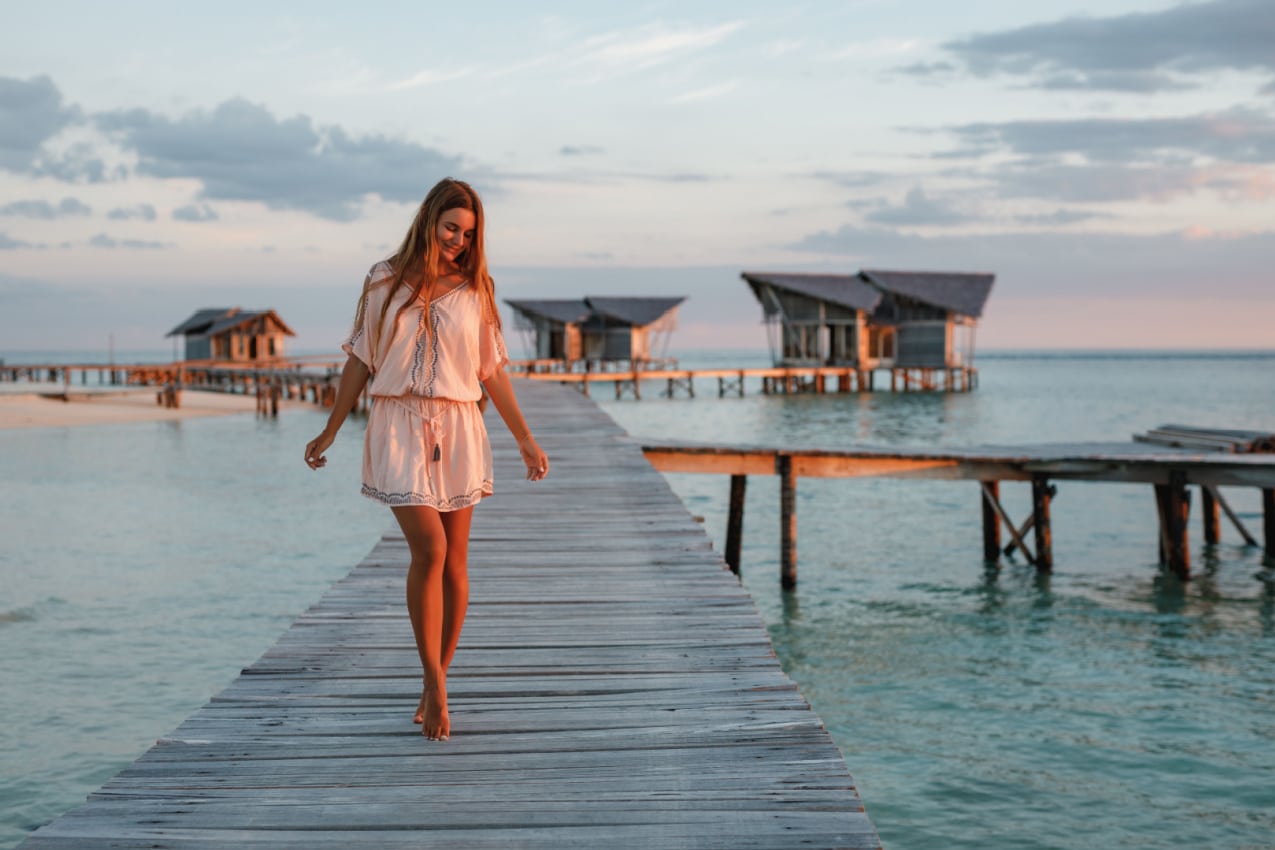
Solo adventurers are welcome in the Maldives. The dreamy resort islands are equipped with security personnel, alarms, cameras, and safety deposit boxes.
However, as the wise traveler you are, exercise regular precautions. Avoid solo walks in secluded spots after dark, and keep a close eye on your belongings.
Ladies, especially those traveling solo, might want to be a bit more mindful around Malé. Being in a Muslim country, consider dressing modestly—wear longer shorts or pants, and tops that cover your shoulders. When you hit the beach, check if wearing swimsuits is acceptable so you can soak up the sun without any unwanted attention.
Perils of Nature: The Risk of Natural Disasters in the Maldives
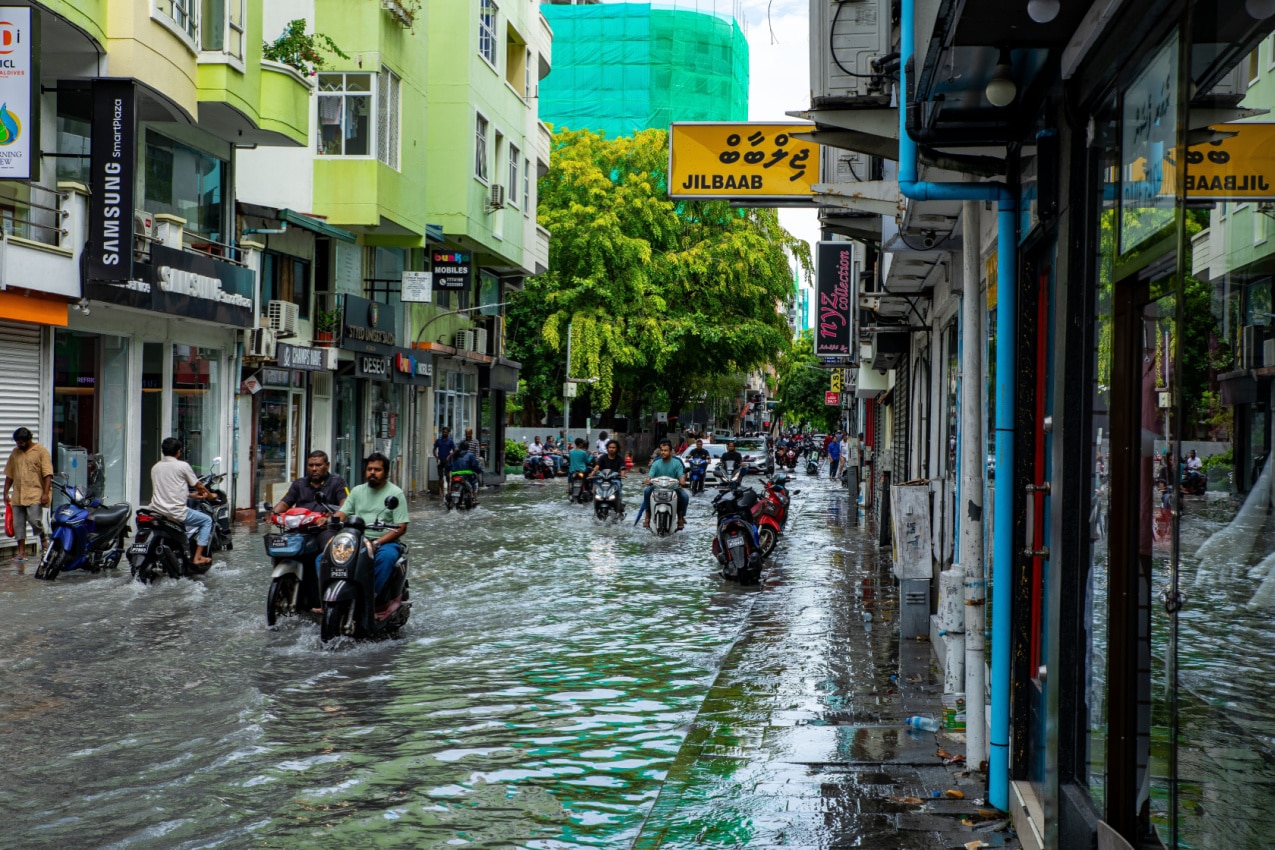
The Maldives is susceptible to several natural disasters, including tropical cyclones, floods, earthquakes, and tsunamis.
Tropical Cyclones
Tropical Cyclones in the Maldives are pretty rare, averaging about once a year. The Bahamas for instance, faces the threat of tropical cyclones about seven times a year.
Tropical cyclones usually hit the Maldives during the Southwest Monsoon from May to October. Some take a few days to make landfall, and others might even change their direction before reaching land.
So if, by some rare chance, a cyclone is heading your way, you’ll have plenty of time to take action. Just steer clear of the beach, and maybe line up some indoor activities until the weather clears up.
Floods
Floods in the Maldives go hand in hand with the Southwest Monsoon season, when there’s increased rainfall and the possibility of tropical cyclones.
However, heavy rainfall is not fixed for that period (May to October). On December 31st, 2023, for instance, heavy rain hit the capital, Malé, causing major floods on main streets and damaging homes.
For floods, there’s nothing much you can do about it except monitor the weather forecasts and maybe plan your vacation when the weather in the Maldives is sunny. If you do find yourself in the midst of a flooded area, keep an eye on weather updates, and remain indoors until everything settles.
Earthquakes
The Maldives doesn’t get many earthquakes because it’s not near the places where they usually happen, called tectonic plate boundaries.
For example, Puerto Rico is close to these boundaries, the North American and Caribbean tectonic plates to be specific, and in the first ten days of 2024, the island suffered a total of 65 earthquakes.
During that same time, the Maldives only had one earthquake with a magnitude of 5.4, and it was 556 miles (896 kilometers) west of Malé. Luckily, there were no reports of injuries or damage.
If there’s an earthquake during your trip to the Maldives, you’ll need to move quickly to stay safe. If you’re inside, drop to the ground, get under something sturdy like a desk, and hang on until the shaking stops. If you’re outside, find an open area away from buildings and stuff like trees and streetlights, then drop to the ground, cover your head and neck, and hold on until the earthquake ends.
Tsunamis
Tsunamis are huge ocean waves caused by underwater earthquakes, volcanic eruptions, or landslides. In the case of the Maldives, they often strike after a major earthquake hits the area.
Such a devastating tsunami occurred on December 26, 2004, when a massive earthquake hit near Sumatra, Indonesia, affecting coastal areas across the Indian Ocean, including the Maldives.
Since then, the Maldives has not experienced a similar disaster. However, the 2004 tsunami prompted the Maldives and other Indian Ocean countries to invest in the Indian Ocean Tsunami Warning and Mitigation System (IOTWS). This system helps provide timely warnings, giving people enough time to take necessary actions.
If you ever receive such a tsunami warning from the authorities, don’t hesitate—evacuate immediately! Head to high ground as far inland as possible. Stay informed with emergency information and follow instructions from local authorities.
Beware the Silent Threat: Carbon Monoxide Poisoning in the Maldives
As of 2023 and 2024, there have been no reported incidents of carbon monoxide poisoning in the Maldives. However, a 2022 survey on fatal incidents among scuba divers in the Asia-Pacific Region identified four scuba incidents resulting from carbon monoxide (CO) poisoning, including one report from the Maldives.
CO can also pose a risk in other settings, such as hotels, where faulty appliances like stoves or water heaters may be potential sources. For instance, in Mexico City, three Americans died in an Airbnb due to CO poisoning from a gas boiler leak in the apartment.
Given that carbon monoxide is both colorless and odorless, its presence often goes unnoticed. To ensure safety during your vacation, it’s recommended to have a chat with the hotel staff about the presence of CO detectors in hotel rooms—or, consider carrying a portable CO detector for extra precaution. If you plan on scuba diving, ensure that the equipment has undergone proper installation, appropriate maintenance, and fitting of pressure-maintaining valves.
If you experience symptoms like headaches, dizziness, weakness, upset stomach, vomiting, chest pain, or confusion, seek medical assistance immediately. These are symptoms of CO poisoning.
Serenity by the Shore: The Safety of the Maldives Beaches
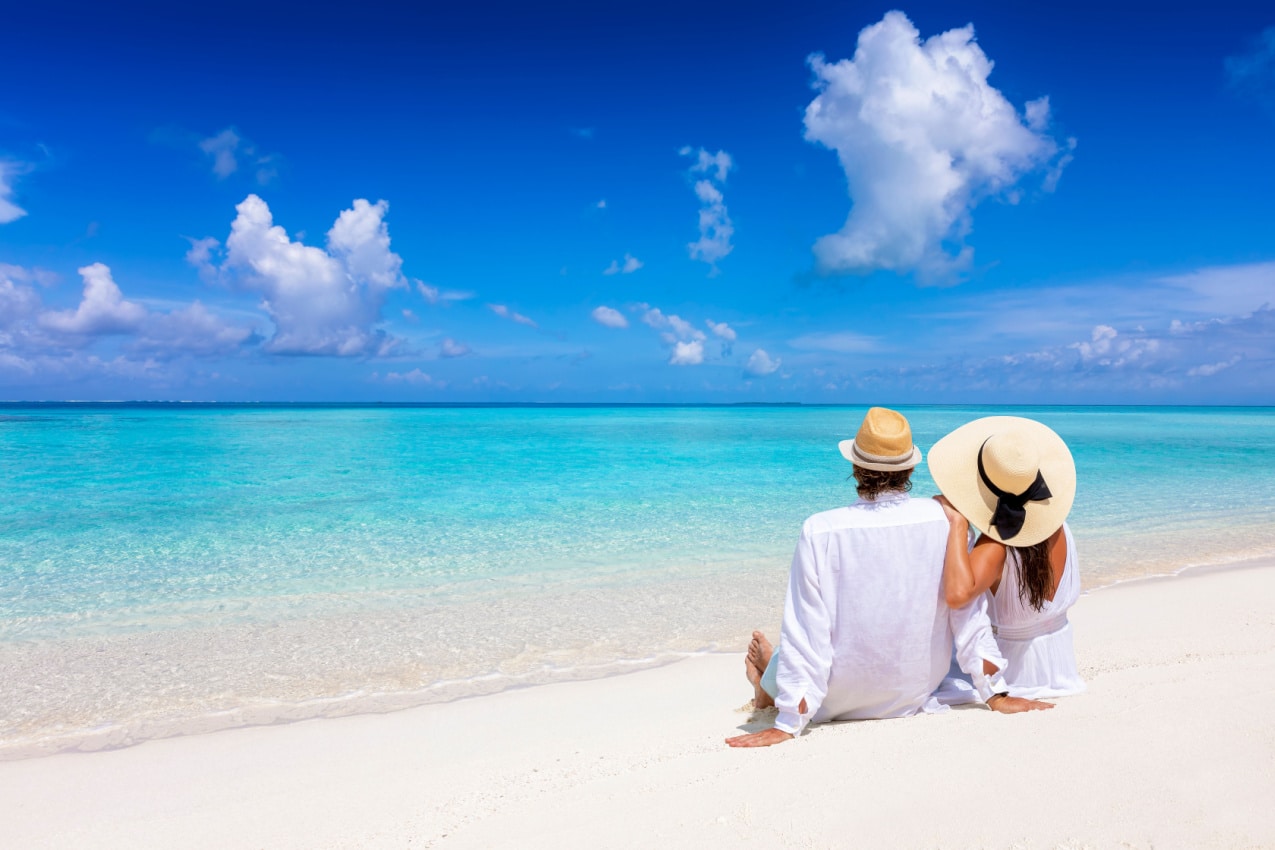
Apart from some strong tidal currents during monsoons, the sea and lagoons in the Maldives are generally calm and safe for sunbathing and swimming. Many islands have lifeguards, and beach warning flags to let you know about swimming conditions.
It’s a good idea to know these flags:
- Green flag: Safe to swim, the waters are calm
- Yellow flag: Swim with caution, the waters experience light surf or currents
- Red flag: Do not swim, there are strong surf or currents
- Purple flag: Do not swim, there is dangerous marine life around
If taking a snorkeling tour, remember that the colorful corals in the Maldives are best enjoyed from a distance—as getting too close can result in cuts and stings from marine life. If that happens, clean the wound with hot water, use antiseptic, and see a doctor. Also, sharks are known to hunt at night, so it’s best to avoid swimming in the waters after sunset.
Take good care of your belongings, as thieves may be waiting to snatch your stuff the moment you enter the water. Don’t forget to protect your skin from the sun and apply plenty of water-resistant sunscreen.
The Maldives Weather Patterns: What to Expect
The Maldives enjoys a tropical climate that remains consistently hot and often humid throughout the year. December to April is the sunny season whereas May to October is the rainy season.
The March-to-May period contains the hottest months, hitting 87.8°F (31ºC). You’ll have some rain, but overall, it’s dry with plenty of sunshine. As May progresses, the southwest monsoon season starts, bringing a higher chance of storms and heavier showers.
June to August may reach highs of 84.2°F (29ºC). Some days may be breezy and perfect, while others may bring storms with heavy rain and strong winds. While these rains usually last for a few hours, they can occasionally persist for several days.
Autumn is often the wettest time to visit the Maldives, but despite the rain, there are still periods of decent sunshine, and temperatures remain consistently balmy, with an average temperature of 81°F (27ºC). From October to November, the winds shift to the northeast, signaling the end of the stormy season and the beginning of drier conditions.
From December onward, the weather is largely hot and dry, with similar temperatures to autumn. While the occasional rain shower is possible, there is almost always plenty of sunshine. This period is considered the peak time for visitors to the Maldives.
Monthly Average Temperatures in the Maldives
| Month | Fahrenheit (°F) | Celsius (°C) |
| January | 81 | 27 |
| February | 82 | 28 |
| March | 84 | 29 |
| April | 84 | 29 |
| May | 82 | 28 |
| June | 82 | 28 |
| July | 82 | 28 |
| August | 82 | 28 |
| September | 81 | 27 |
| October | 81 | 27 |
| November | 81 | 27 |
| December | 81 | 27 |
Source: Holiday-Weather, 2024 data
When Is the Best Time to Visit the Maldives?
The ideal time to visit the Maldives is from December to April, avoiding the monsoon season and basking in endless sunshine.
For the driest and sunniest weather, January to April is prime, so if your budget allows and you don’t mind a bit more tourist activity, you’ll enjoy nothing but sunshine and serene seas.
Temperatures remain warm from May to October, but there’s a higher chance of rain and a risk of tropical cyclones. Nevertheless, extended sunny spells are common. Plus, the wet season accompanies attractive prices, making it a budget-friendly option!
Diving is fantastic year-round, but you’ll enjoy better visibility on the western side of the island between May and November and the eastern side between December and April.
Remember that you’ll be visiting a Muslim country, so it’s essential to note the dates of their biggest holiday, Ramadan. When this holiday begins, many restaurants in the capital, Malé, and other urbanized areas will likely be closed during the day. As for the island resorts, they are usually not affected. The majority of restaurants and bars will be open and serving alcohol, but it’s best to double-check to be sure.
How to Stay Safe in the Maldives
- Respect local customs and practice your religion privately. Embracing other religions besides Islam is against the law.
- Savor your favorite drinks responsibly. Alcohol is allowed in the resorts, but in urban areas like Malé, it’s illegal.
- Embrace modest dressing. When exploring non-resort areas, especially in Malé, adhere to conservative dress codes.
- Not all beaches allow bikini wear. Search for designated areas in the resorts where you can wear revealing swimwear. Nude and topless sunbathing isn’t allowed.
- LGBTQ+ travelers should exercise discretion. While LGBTQ+ couples are welcomed in resorts, don’t show signs of affection in public as it is illegal.
- Show respect during Ramadan. Unless you are in the comfort of your resort, refrain from eating, drinking, or smoking in public during daylight hours.
- Say no to drugs. Any involvement with illegal substances can lead to severe penalties.
- Be wary of public demonstrations. If such an event is happening, stay away from the area to dodge potential violent incidents between the police and demonstrators.
- Protect your belongings. While crime rates are low, petty crimes like theft may happen, so safeguard your belongings and use safe deposit boxes provided by resorts.
- Respect wildlife conservation laws. Don’t purchase souvenirs like tortoise shells and corals.
- Stay updated with news with The Maldives Newspaper, Maldives Transport for public transportation, Avas Rides for taxis, and Foodpanda for convenient food delivery.
- Stay connected without relying solely on public WiFi. You can purchase a SIM card from Dhiraagu, the leading mobile provider in the Maldives.
Emergency Numbers
- Police: 119
- Fire brigade: 118
- Ambulance: 102
Stick to the Resorts & Your Safety in the Maldives Is a Given!
All in all, crime isn’t a major concern at those dreamy Maldivian resorts where most tourists spend their vacation. Still, keep an eye on your stuff, as petty theft does happen!
Now, if you’re headed to the capital Malé, crank up your caution a bit. That’s where most events you’d want to avoid happen—thefts, drug-related incidents, demonstrations, and some violent behavior.
Remember, the Maldives is a Muslim country, so it’s crucial to respect the local norms and religious laws. Finally, check the weather, toss in your sunscreen, and get ready for an awesome time in the Maldives!
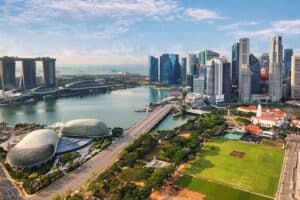
Looking forward to a similar guide about Sri Lanka!